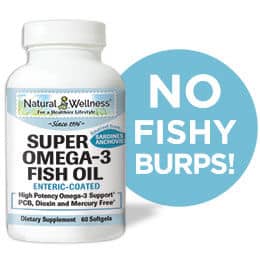

FACT: Everyone drinks water. Everyone eventually dies. So, since anyone who has ever drunk a glass of water has died, drinking water has a 100% mortality rate. Therefore, water is bad for you. Water is deadly. Drinking water will kill you.
That correlation is absurd. You don’t have to be a physician or scientist to know that everyone must drink water to live; everyone eventually dies; and very few people have ever died from drinking clean water. We know that water is good for us, and no “scientific” research can convince us otherwise.
But that is essentially the connection that the “Plasma Phospholipid Fatty Acids and Prostate Cancer Risk in the SELECT Trial” study is trying to make between omega-3 fatty acid supplementation and prostate cancer risk. But, more about that later.
Before discussing the frailties of this study and its findings, attention must be paid to the irresponsible actions of the news media. Virtually every outlet reacted to one statistic, and its accompanying inflammatory quote from the study’s author, by publishing headlines like: “Hold the salmon: Omega-3 fatty acids linked to higher risk of cancer” (CNN). Many in the functional medicine world have responded by declaring a media and medical community bias against nutritional supplementation as the driving force for this debacle. That may or may not be true, but what should be clear to all is that the news media’s primary agenda is to increase advertising revenue by increasing viewers and readers, etc. Media outlets always choose bad news over good and scary headlines over soothing ones, because bad news sells. This is what they do. In this case they grabbed an erroneous conclusion from a flawed study and ran with it because it made dollars sense. “Never let the facts get in the way of a good story” is their credo – and they don’t.
Let’s look at the facts.
Reading the Fine Print
There is a whole lot wrong with this study and its conclusions. But, the analysis of it (and there’s tons) can be mind-numbing. This article is designed to boil it down to the most salient points, which should be enough to debunk these conclusions about fish oil. If you wish to delve more deeply in to this subject, please follow the links listed below.
FACT: This study is now erroneously referred to as “The Fish Oil Study.” It was never designed to evaluate omega-3 fatty acids and not a single milligram of fish oil was administered to any of the subjects at any time before, during or after the analysis. This study was designed to evaluate the potential for selenium and vitamin E to prevent prostate cancer. The findings that led to this report were incidental and not subject to the rigors of scientific method.
FACT: The blood levels of omega-3 fatty acids were measured at 4.66% for men with prostate cancer and 4.48% for those without. That is an absolute difference of less than two-tenths of 1%. This is a statistically and scientifically inconsequential finding, yet it was the basis for researchers to proclaim a 71% increase in risk for developing aggressive prostate cancer.
FACT: No data was ever compiled regarding fish oil consumption by any of the test subjects at any time during the entire course of the study. There’s no basis for correlation of fish oil consumption to increased prostate cancer risk based on the data compiled in this study.
FACT: The conclusions of this observational assessment were based on a one time blood test measurement of a biomarker done at a single point in time. This biomarker, blood plasma levels of omega-3 fatty acids, can be influenced significantly by consumption within a 24-hour period. If a group of test subjects happened to go out to Red Lobster for the all-you-can-eat salmon dinner, they would skew the results of this study precisely because of its design flaws. This assessment was not sufficient to demonstrate a positive correlation between fish oil supplementation and prostate cancer.
FACT: This study ignored the following contributory health factors in test subjects when evaluating the data:
- 53 percent of the subjects with prostate cancer were smokers
- 64 percent of the subjects with prostate cancer regularly consumed alcohol
- 30 percent of the subjects with prostate cancer had a first-degree relative with prostate cancer
- 80 percent of the subjects with prostate cancer were overweight or obese
All of these factors are significant contributors to elevated prostate cancer risk, yet they were not factored into the assessment.
FACT: The “Plasma Phospholipid Fatty Acids and Prostate Cancer Risk in the SELECT Trial” was an observational study. It was not a randomized, controlled, double-blind study, nor even a clinical trial. Yet the researchers interpreted the data as if it met the rigorous standards of a scientific trial. They chose to make a correlation between prostate cancer and essential fatty acid supplementation where no correlation was demonstrated. Moreover, even if a correlation was demonstrated in this study, correlation is not causation. Just as a history of drinking water being common to all people who die does not prove that water causes death; there is no legitimate evidence from this study demonstrating that fish oil causes prostate cancer.
FACT: There have been hundreds, maybe thousands, of studies performed over the past 30 years that document the positive health effects of omega-3 fatty acid supplementation. Reams of quality scientific literature support its safe use for cardiovascular health, neurological support, pain management, and many, many more health applications. There are at least 12 studies that directly contradict this study’s conclusions. The overwhelming preponderance of evidence indicates that this supplement is safe and effective.
OPINION: In functional medicine it is commonly known that blood levels of omega-3 fatty acids in moderate fish eaters will be measured at about 5-6%. In people who supplement with a quality essential fatty acid product blood levels can be expected to be 8-11%. The blood plasma levels measured in this study do not indicate any significant level of omega-3 consumption in either group of test subjects. Very likely this test population was slightly deficient, as most Americans who do not use a fatty acid supplement or eat fish regularly are. Considering the complicating factors listed above, it can be inferred that these findings point to a need for more omega-3 fatty acids in the diet of males at risk for prostate cancer – not less.
CONCLUSION: Omega-3 fatty acid supplementation has a long history of beneficial effects in a wide array of human health applications. Those interested in supplementing their diet with fish oils should feel confident that they can do this safely and without increasing their risk for prostate cancer. The single caveat to this advice is to use a high quality, purified source of fish oil such as Super Omega-3 Fish Oil. Omega Complete is the highest quality fish oil sourced exclusively from salmon and/or cod liver oil delivered in a highly absorbable, lemon-flavored emulsion. By emulsifying fish oil, it allows for production of a pleasant-tasting supplement. It can also enhance digestion and absorption of the fatty acids.




